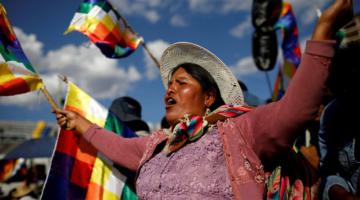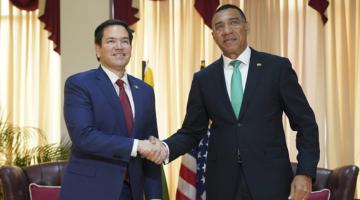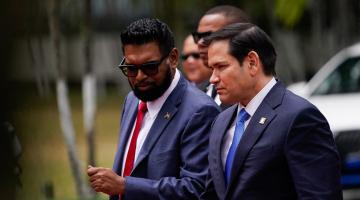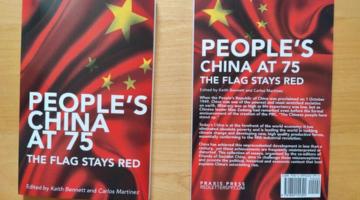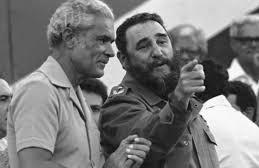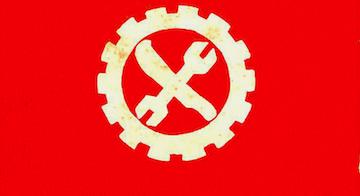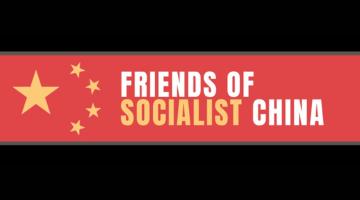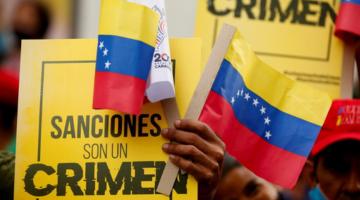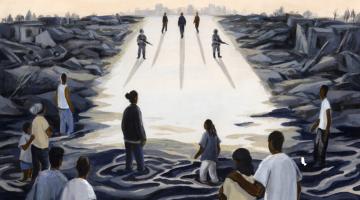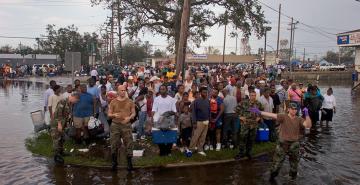Both class and color barriers were broken down during the Michael Manley era, but class barriers re-emerged.
Last week, in “Remembering Jamaica in the East/West Crossfire,” we explored the legacy of Jamaican Prime Minister Michael Manley and the Socialist movement he led. In Part II, written with the help of Jamaican resident Riva Enteen, we discuss Manley’s programs with Carlton Anderson, a retired industrial efficiency expert who grew up while Manley was in office and who greatly benefited from Manley’s educational reforms. He is now the Chair of the Alumni Association at Knockalva Polytechnic College, which he was able to attend once class and color barriers came down during the Manley era.
ANN GARRISON: Carlton, can you describe Prime Minister Michael Manley in brief?
CARLTON ANDERSON: Manley was not an ordinary person. His father Norman Manley was a Rhodes scholar and an exceptional track and field athlete, so Michael was raised in privilege. His mother Edna was a successful artist, with a Jamaican art school named after her.
The Manleys were mixed race, light-skinned, and privileged, but they sided with Jamaica’s poor, darker-skinned majority. Michael Manley tried to implement his father Norman Manley’s vision. He was also a great orator capable of inspiring the people.
AG: Can you tell us about the family you grew up in to help us understand what he made possible?
CA: Absolutely. I grew up in a nuclear family of nine children. Three died, the two oldest, and the youngest, and six of us survived.
AG: Were your family farmers?
CA: Definitely. That's all they knew how to do. My mom described herself as an entrepreneur because she opened a little shop where she sold goods and services to the people within the community. My dad was primarily a farmer.
AG: You grew enough to feed yourselves and grew enough more to sell some?
CA: Yes. My dad produced sugar cane, which he sold to the factory. And he produced yams which he sold to the local people.
My mom would take a truck from Hanover and go all the way to Kingston to the infamous Coronation Market where she sold the yams. It required her to be in Kingston two to three weeks to sell all the yams. My dad was one of the biggest yam farmers in Hanover.
AG: So you were poor, but your parents were successful at smallholder farming.
CA: Absolutely.
AG: Tell us about your experience at school when Prime Minister Michael Manley was in power, from 1972 to 1980.
CA: I always had drive and a thirst for knowledge. I don't think I was the smartest kid in the room, but you could not break my confidence. So from the elementary to the primary to the secondary school, I always had that eagerness and drive to want to get to school and learn.
But with my parents as farmers, I had to take days off to work on the farm. That put me in a tough situation where I would have to spend extra time to catch up, but I turned out to be one of the biggest achievers in my class.
AG: Then you tested into one of the best schools on the island, right?
CA: Yes, It was an agricultural school. Because my parents were farmers, I naturally gravitated toward learning the science of farming. When I was 16 I tested into that school, and then from 16 to 18 I was housed away from home, on campus.
Manley's educational reform is what made this possible for me and others. That school was designed primarily for the descendants of plantation owners and other white and light-skinned, mixed race elites. Those folks used to go to those schools, not kids who are as dark-skinned as I am.
There was a guy in school before me who told me he couldn’t attend that school even though he was academically qualified, because he was too dark–skinned. This was in the ’40s or ’50s when they could still say “this kid is too black.” The white and light-skinned elites did not want their children mixing with the black peasants. Manley made it affordable for us, with full scholarships for people like me.
I was in school in the ’80s after Manley lost the 1980 election, but at that time his educational reforms were still in place, and poor, dark-skinned kids were able to get into these schools. Anyone could afford it. But now the fees for these institutions are expensive for most Jamaicans, whether they can test in or not.
AG: So under Manley, both color and class lines were broken down, but the class lines returned.
CA: Correct. And this is true in schools across the board. Now, 45 years after Manley began to institute educational reforms, all the magnet schools in all the parishes require expensive fees. That significantly weakened his programs.
I’m now the head of the alumni association of that college, and one of my goals is to make it affordable again for any Jamaican who can pass the entrance exam. I always said that after many years working in the States, I would come home and make a contribution.
RIVA ENTEEN: I have been told that due to the bus and lunch costs, many of the parents run out of money. Is that true? That kids can't go to school on Thursday or Friday because their parents have run out of money for bus fare and lunch?
CA: Absolutely. That's why it's not free education anymore. Luckily, I never missed school because I didn't have food or clothing or books. During the Manley era, there were free lunches at school. No kid went to school suffering from hunger. The Michael Manley government made sure there was a food program in schools.
AG: Sounds like a national version of the Black Panther Party breakfast program.
CA: Exactly.
RE: The Panthers knew kids can't learn if they are hungry.
CA: Yes, the Black Panthers in America were equivalent to the Rastafarians in Jamaica in that they were resisting state oppression.
RE: The State went after both of them.
CA: Of course. In the 1963 Coral Gardens Massacre, Jamaican police and military forces detained Rastafarians across the island, torturing and killing many, after a violent conflict that began at the Rasta community in Montego Bay. The community was growing food there and the state wanted to take the land for tourism.
AG: That sounds similar to the Philadelphia Police bombing of the Black MOVE community in 1985, where 11 people were killed.
CA: Very similar. Both were communities taking care of themselves. There’s a film, Bad Friday ~ Rastafari after Coral Gardens about the Coral Gardens Massacre.
AG: What did you do after finishing at the elite college that Manley made it possible for you to test into?
CA: When I finished college here, I started working for the government at the Ministry of Agriculture in a program helping small farmers. It was an excellent program, although there was some misappropriation of funds.
However, my paycheck was so small that I couldn't even feed a dog, and I didn't have a dog.
So that is largely why I wanted to move away to get more education. Texas opened its doors to me, and an American education is accepted globally. The University of the West Indies is very good, but it’s not accepted globally, and I wanted to get out of poverty. I didn't want to have to ride a donkey into the bush to do manual labor all day.
AG: You got several degrees in the US.
CA: I got a Bachelor of Science in Agriculture, an MBA in International Business, and a Master of Science in Industrial Engineering and Management. That’s what opened doors for me. I was even able to build a home in Texas for my parents.
RE: Your parents must have been so proud.
CA: They were more than proud. Being financially stable I could help take care of them. For the next 10 years my father didn't have to worry about where the next meal was coming from. After my father died, my mother moved up to the States. They were proud and grateful that I didn’t just leave them behind.
My mother didn't even have a birth certificate, which I only learned when trying to get her a passport, but my son has his BA and MA, and is now about to get his PhD. My father was illiterate and my mother only had a fourth grade education, but my son is taking it to the doctoral level.
AG: Can you tell us more about Michael Manley’s educational programs?
CA: He instituted the Jamaican Movement for the Advancement of Literacy (JAMAL), an evening program for adult illiterates. They were able to go to the churches and community centers to learn their ABCs and how to write their names before they died. He believed that no child or adult should be left behind. He believed that people were not too old to learn.
AG: I looked online and JAMAL seems to have been transformed into the Jamaican Foundation for Lifelong Learning (JFLL) and expanded to offer high school equivalency degrees. Would you say that means that Manley’s educational legacy has survived at least in that form?
CA: Yes.
AG: What did Manley do for women’s rights?
CA: In those days a woman’s place was at home or in the bush farming, not in school. Everything was biased against women. Even though my father couldn't read or write and my mother could, his name was on all the bank papers.
RE: Manley, thanks to his wife Beverly, decided not only to increase benefits for new mothers, but he didn't distinguish between married or unwed mothers and their children. All mothers were treated with dignity and given any social privileges that derived from being a mother.
CA: Yes, he said there are no bastards in Jamaica.
RE: This is a Christian country, yes?
CA: Yes, with a Protestant majority. So when Manley said that married and unmarried mothers were to be treated equally, the church wanted to kill him. Seriously. The church is very, very conservative here. My parents thought that Bob Marley played the devil’s music.
RE: What about birth control?
CA: I had sex education in high school, and they gave out condoms.
Bastards as second class citizens was a major problem in Jamaica then, and Manley spoke out for the dignity of both the mothers and the children. He said that marriage has nothing to do with pregnancy. He was way ahead of the curve.
RE: It seems like Cuba helped provide a blueprint for women's rights and how community services can be provided.
AG: And Thomas Sankara in Burkina Faso.
CA: Michael Manley improved that greatly in Jamaica, but there’s still a lot more work to be done.
AG: What about workers’ rights?
CA: There were trade unions to make sure that even the common man on the farms, especially the sugar cane farms, had representation. The union leaders traveled around the country to be familiar with the workers they represented. The unions established job security, and Jamaica boomed with that representation, which then expanded into the hotel industry. There was a minimum wage.
The trade unions, however, didn’t survive the end of the Manley era.
AG: Did unions achieve collective bargaining?
CA: Yes, but what they were fighting for was actually a pittance. But at least somebody was there to fight for them.
AG: What did Manley do about health care?
CA: Each parish had a hospital, and local clinics were strategically built throughout the communities. Medical, vision, and dental were provided. That was a huge leap forward.
Back in some of these communities Manley reached, there are neither roads nor running water, but nurses would arrive for home births.
AG: What about agricultural reform?
CA: We gained independence from the British in 1962. When Manley came into office in 1972, he looked at the Crown Lands that became government land after independence and divided them up into smaller parcels. He wanted farmers to own their own land. Agricultural government workers would go around to these farmers to teach them best practices on how to cultivate, what to grow. The small farms were leased to farmers for nominal fees and some got grants. Eventually, if they worked the land, they were given the first option to buy it at an affordable price.
Farmer’s markets were created in every parish and many but not all of them have survived.
AG: Jamaica’s greatest mineral resource is its bauxite. In 2023, it was the ninth greatest producer of bauxite and its reserves are always ranked within the top 10 in the world.
Bauxite, for readers who may not know, is a sedimentary rock with a high aluminum content which is used to produce aluminum. Jamaica has always been trapped in the role of raw bauxite exporter, which doesn’t bring in the wealth involved in aluminum manufacture. I get the idea that the first stage of processing—turning rock into alumina—takes place here, and that alumina is then exported to manufacture products elsewhere.
It seems the concession was long held by an American consortium, Anaconda, Kaiser Aluminum, and Reynolds Metals, but they transferred it to a Chinese company, Jiuquan Iron & Steel Company.
Could you tell us what Michael Manley tried to do with the bauxite resource and what went wrong?
CA: We needed the infrastructure to process our bauxite and manufacture aluminum. Manley understood that if we were stuck in the role of simply exporting our bauxite, we would always be vulnerable to the fluctuating price of that one resource, and we would never develop the technology, complex division of labor, and dynamic economy that come with industrialization.
The US didn't want us to have an aluminum industry because that would make us a rich, industrially developed country. When the West and the International Monetary Fund give aid, the last thing they want to do is encourage industry that will enable a country to actually develop. Of course they didn’t want that. They want to create dependence and debt servitude.
AG: Manley at least managed to impose a 7% tax on bauxite, which helped fund education, but even that greatly upset the American and Canadian aluminum manufacturers. In 1974, Time Magazine reported:
“The payments presage substantial price increases in the U.S. on aluminum products ranging from lawn chairs to beer cans—and foreshadow difficulties industrialists may encounter from now on in dealing with poor countries that possess vital raw materials.”
The US and Canadian consortium asked the US for help, escalating the pressure that the Manley government was under, but it appears that the 7% tax has survived.
CA: Yes, but it is not being used to benefit the people as it was when he imposed it; it’s no longer earmarked for education. And even with the 7% levy, we’re still stuck in the vulnerable role of exporting a natural resource instead of developing a complex economy.
To make it worse, foreign entities own a controlling interest, 51%, in the bauxite mining company. Michael Manley tried to force the bauxite-rich companies to sell the land they had acquired back to Jamaica and give Jamaica a 51% share in the consortium, but he never prevailed. His attempt to use Jamaica’s greatest resource to develop and lift it out of poverty ultimately failed under US and IMF pressure, and all the overt and covert operations you described last week.
AG: Next to last question . . . the 1980 election in which Manley was defeated, was the most violent in Jamaica’s history, leaving more than 800 people dead. It took place as the IMF was squeezing Jamaica so mercilessly that Manley had no choice but to lay off hundreds of public employees and had very little room to move on his progressive agenda.
It was reported that some polling stations didn’t open, people stood in line for hours, [ballot] boxes were tampered with, and there was a full count of ballot boxes even in areas where people didn’t vote.
Do you think that Manley really lost in a landslide, as was reported? Or do you think we’ll ever know?
CA: I don’t think we’ll ever know.
AG: Last question . . . do you see any hope for the future, and if so where?
CA: I am an optimist, so I must have hope, but I will admit that it looks very dismal. There are thieves whose goal is to steal. Just look at the roads. They are terrible. Do I have hope? Yes. I am back here in Jamaica, and I wouldn’t be otherwise. But do I see the manifestation of a better governance in this country? No. It's sad, but I don't.
The 63-year embargo of Cuba is meant to be a lesson to the other countries of the Caribbean not to do what Fidel did. An example was made of Cuba, so now we are all afraid to say no to the big man.
When Manley returned to power from 1989 to 1992, he wasn’t nearly so ambitious as in his first term, no doubt given everything that had kept him from achieving his earlier goals.
The person who is going to lead Jamaica out of poverty is probably not born yet. There doesn’t seem to be anyone now who is brave enough to stand up and say no to the US empire.
AG: Some people seem encouraged that Cuba has just been accepted into BRICS, which might finally help them to climb out from under 63 years of US sanctions.
CA: That could be an interesting development.
Ann Garrison is a Black Agenda Report Contributing Editor based in the San Francisco Bay Area. In 2014, she received the Victoire Ingabire Umuhoza Democracy and Peace Prize for her reporting on conflict in the African Great Lakes region. She can be reached at ann@anngarrison.com. You can help support her work on Patreon.
Riva Enteen is the former program director of the San Francisco National Lawyers Guild. She is a lifelong peace and justice activist, retired social worker, lawyer, and editor of ”Follow the Money,” interviews by Pacifica Radio Flashpoints producer Dennis J. Bernstein. In 2019, she went to Russia with a 50-member peace delegation.

